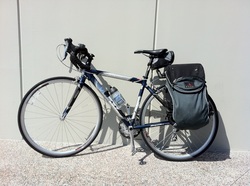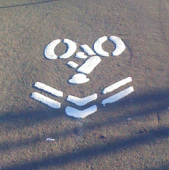\bi-ˈreft\
 Specialized Sequoia Elite (2007).
Specialized Sequoia Elite (2007). Vanished.
Disappeared from a city-installed bike rack on a busy corner in the middle of the work day.
I think I stood with my mouth hanging open for nearly a minute. My lovely friend offered hugs and the loan of her spare bike. A passerby stopped to ask if we needed help. A kind man working in the bank whose windows overlook the rack said that no, he hadn’t seen anything and unfortunately their outdoor security cameras cover the ATM, not the bike rack. (Some priorities, these!) So I filed a police report, talked with our insurance agent, and made my way to my afternoon appointments on the bus.
For a day or two after I was more than a little stunned. I kept mentally revisiting the rack, each time surprised anew by the bike-shaped mass of air filling the space where she ought to have been. I could almost see the dotted lines outlining her absent shape.
Sure, I was pissed off. Distressed at the time and expense of replacement. Sad that people steal, whether from greed or necessity.
But more that that I felt bereft.
Bereft is a very old word. It’s from the Old English beréafian: the prefix “be-” plus réafian, which means to rob, to raid, to carry off, to break a hole in, to pluck. Before that the Old Saxons called it birôƀôn, the Old High Germans biroubôn, the Goths biraubôn, and before that the early Germans said *birauƀôjan.
The word been around as long as loss. After the Vikings or the Ostragoths or the Huns swept through, the survivors huddled beneath their smoking rooftrees, staring at the air filling the space where their goods, or their cattle, or their children had once been. Bereft.
Viewed in that light, this is honestly pretty trivial. It’s just a bicycle. We will not starve in the winter because of a plundered granary or grieve a kidnapped child. This is a middle-class annoyance.
But still—I feel forlorn. Far more, I think, than if I had lost a car (though I hasten to add that I am NOT in any hurry to test this hypothesis).
One friend suggested that putting in maintenance hours on a bike or car makes it dearer to us, but I don’t think that’s the case here. I spent some time getting her set up the way I wanted, but I was never one to lovingly polish the frame or tinker with the gears. I fixed the flats, kept the drive train clean and lubed, and got where I wanted to go.
Others have said I’ve lost a friend, even a part of the family. That’s not right either. She wasn’t a member of the family. She never had a name, though I always thought of her as “she.” She didn’t have a personality. And she wasn’t a friend, though I suppose she was a companion of sorts.
She was a tool, an expression of my will, an extension of my body that moved me through the world. She was part of me.
So now I have an odd version of phantom limb, forgetting she's gone until I am brought up short by the stump where she used to be. There’s an empty spot in the garage. My calendar shows two meetings 3 miles apart and I suddenly realize that no, I can’t just ride between them. I run errands on the battered old hybrid I handed down to Arwulf when she started middle school. It steers like a tank, and there's something seriously amiss with the rear wheel. I hitch along, grumbling and remembering how it used to feel to hit this hill, that curve, the long straightaway down to our corner.
When the time comes (and the insurance comes through) I will go out and find another ride. But I feel the need to memorialize my companion—plucked up, tossed into some raider’s longboat and shipped off to Craigslist or dismantled for parts.
She was a good bike.
I’ll miss her.


 RSS Feed
RSS Feed